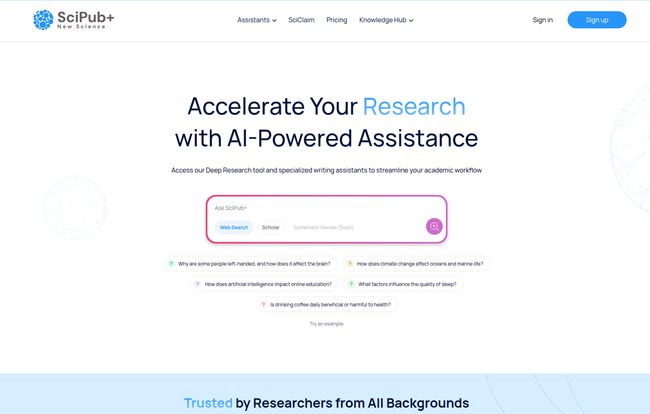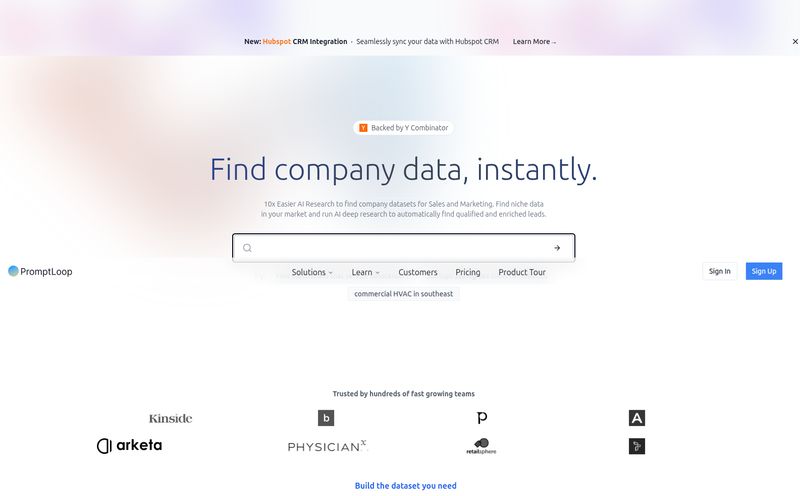If you're in academia, you know the feeling. The blinking cursor on a blank document. The mountain of papers for a literature review that seems to be actively mocking you. The very specific, almost arcane formatting rules that differ from journal to journal. For years, we've wrestled with this, fueled by coffee and sheer willpower. Then AI writing tools came along, and for a moment, it seemed like we had a secret weapon. But using a generic AI for academic writing often feels like trying to perform surgery with a sledgehammer. It’s powerful, sure, but lacks the necessary finesse.
That's the promise of a tool like SciPub+. It’s not trying to be everything to everyone. Instead, it claims to be a specialized toolkit built from the ground up for us—the researchers, the grad students, the people who live and breathe citations and methodologies. I’ve spent years in the SEO and traffic world, watching trends, so when a tool this specialized pops up, my curiosity gets the better of me. Is it just another shiny object, or is it the real deal? I decided to take a closer look.
So, What Exactly Is SciPub+ Anyway?
Think of it less as a single AI writer and more as a team of highly specialized research assistants. SciPub+ breaks down the monumental task of writing a research paper into manageable chunks, offering a dedicated AI assistant for each stage. The landing page mentions 10 specialized assistants, which immediately caught my eye. We're talking about dedicated tools for:
- Outlining your paper
- Drafting an introduction
- Conquering the literature review
- Writing the methods and results sections
- Crafting a compelling conclusion
- ...and more.
This is a fundamentally different approach from just feeding a prompt to a general-purpose AI. It's designed to understand the workflow and conventions of scholarly publishing. It knows that writing a 'Methods' section requires a different tone and structure than an 'Introduction'. That, to me, is its core value proposition.

Visit SciPub+
Breaking Down The Scholarly Grind, One Assistant at a Time
From Blank Page to Brilliant Outline
Starting is always the hardest part. SciPub+’s outlining tool is designed to combat that initial paralysis. Instead of you just staring into the void, it helps you build the skeleton of your paper. This isn't about writing the paper for you; it's about creating a logical structure that you can then flesh out with your own brilliant research. For anyone who’s ever gotten lost in the weeds of their own argument, having a clear roadmap from the get-go is a lifesaver.
Finally Taming the Literature Review
Let's be real, writing a literature review can feel like trying to herd cats in a hurricane. It’s one of the most time-consuming and frankly, soul-crushing parts of the process. The idea of an assistant that helps synthesize sources, identify themes, and structure the narrative of what's already been done in your field is incredibly appealing. It helps turn a pile of papers into a coherent story.
The Nitty-Gritty: Methods, Results, and Polish
The other assistants follow this same philosophy. They provide targeted help for the dry, technical sections like 'Methods and Materials' and help you present your 'Results' clearly and concisely. Then, when all the core components are in place, other assistants help with polishing the intro, conclusion, and abstract, ensuring your paper has a professional sheen from start to finish. It’s a full-cycle support system.
My Honest Take: The Good, The Bad, and The AI
No tool is perfect, right? After playing around with it and looking at what it offers, here's my unfiltered perspective. I’ve seen a lot of tools promise the world, so I’m always a bit skeptical.
What I Really Liked
The specificity is the biggest win. It's refreshing to see a tool that isn’t trying to write a marketing email one minute and a sonnet the next. It’s built for academics, and it shows. The platform seems to genuinely understand the structure and flow of a research paper, which can dramatically cut down on the frustrating busywork. For grad students especially, I see this as a huge productivity booster and even a learning tool for understanding how strong papers are structured. The claim of being trusted by researchers from places like Princeton and Harvard adds a nice layer of credibility, too.
A Few Things to Keep in Mind
First off, this isn't a magic wand. You can't just press a button and get a Nobel-winning paper. It requires your input, your ideas, and your critical eye. There’s likely a bit of a learning curve to get the most out of it. Secondly, full access isn't free. While there's a free tier, the real power is in the paid plans, which is pretty standard for quality software. And finally, there's the ever-present debate about AI in writing. My take? Tools like SciPub+ are assistants. They are to a researcher what a calculator is to a mathematician—it handles the tedious computation so you can focus on the higher-level theory. It's crucial to use it to enhance your skills, not replace them.
Let's Talk Money: SciPub+ Pricing Explained
The pricing structure is actually pretty reasonable, especially for the academic market. They’ve broken it down into a few tiers, which makes sense.
| Plan | Price | Key Features |
|---|---|---|
| Apprentice (Free) | $0 | 100 monthly credits, access to GPT-4o, tailored for academic writing, single research field. Great for a test drive. |
| Geek | $2.49 /month | 500 monthly credits, early beta access, outline preview to save credits, single research field. |
| Fellow | $8.99 /month | 5,000 monthly credits, PDF upload feature, priority support, and unlimited research fields. |
The Student Deal is a Game-Changer
Okay, this part is huge. SciPub+ offers a special deal for students: if you sign up with a verified .edu or .ac email, you get a 3-month free trial of either the Geek or Fellow plan, followed by a permanent 30% discount. This is incredibly smart. It puts a powerful tool directly into the hands of the people who might need it most, at a price point that a student budget can actually handle. It shows they understand their audience.
SciPub+ vs. Generic AI Writers (like ChatGPT)
This is the question on everyone's mind. Why pay for SciPub+ when you have free access to other powerful AIs? It comes down to the classic debate: generalist vs. specialist. ChatGPT is a Swiss Army Knife. It can do a thousand things pretty well. SciPub+ is a surgeon's scalpel. It does one thing—academic writing—with precision and expertise. You won't have to spend half your time crafting the perfect prompt to explain what a 'literature review' is or how a 'methods' section should be formatted. The platform already knows. It saves time and, more importantly, mental energy.
Conclusion: Is SciPub+ Worth It for Your Research?
After this deep dive, I'm genuinely optimistic. SciPub+ isn't trying to replace the researcher; it's trying to be the best damn research assistant it can be. It automates the tedious, structures the chaotic, and polishes the rough drafts, freeing you up to do what really matters: think, analyze, and discover. The biggest hurdle for any academic is time and mental bandwidth. By tackling the grunt work of writing, this tool could give you more of both.
If you're a student or researcher who constantly finds themselves bogged down by the writing process, I think it's absolutely worth checking out. Start with the free Apprentice plan, see how it feels. And if you’re a student, that 3-month trial is practically a no-brainer. It might just be the tool that helps you finally conquer that blinking cursor for good.
Frequently Asked Questions (FAQ)
- Can SciPub+ write my entire paper for me?
- No, and you wouldn't want it to. It's an AI assistant designed to help you structure, draft, and refine your own ideas. You are still the author and the critical thinker behind the research.
- Is SciPub+ better than ChatGPT for academic writing?
- It's not about being 'better' but more 'specialized'. SciPub+ is specifically trained on the conventions and workflow of academic papers, which can save you significant time and effort in prompt engineering and editing compared to a general-purpose AI.
- Is there a free version of SciPub+?
- Yes! The Apprentice plan is free and gives you 100 monthly credits to test out the core features and see if the platform is a good fit for your needs.
- How does the student discount work?
- You just need to sign up using a verified academic email address (ending in .edu or .ac). This will give you a 3-month free trial of a premium plan (Geek or Fellow) and a 30% discount on that plan afterward.
- Will using SciPub+ be considered plagiarism?
- Using SciPub+ as an assistant to help organize your thoughts, rephrase your own sentences for clarity, or structure a section is not plagiarism. It's a writing tool. However, you are responsible for the final work, and you should always check your institution's specific policies on the use of AI tools in academic work.
- What are 'credits' in SciPub+ and how are they used?
- Credits are used to process your requests with the AI. Each task, like generating an outline or a paragraph, consumes a certain number of credits. The paid plans (Geek and Fellow) offer features like an outline preview to help you estimate credit use and manage your monthly allowance more effectively.



